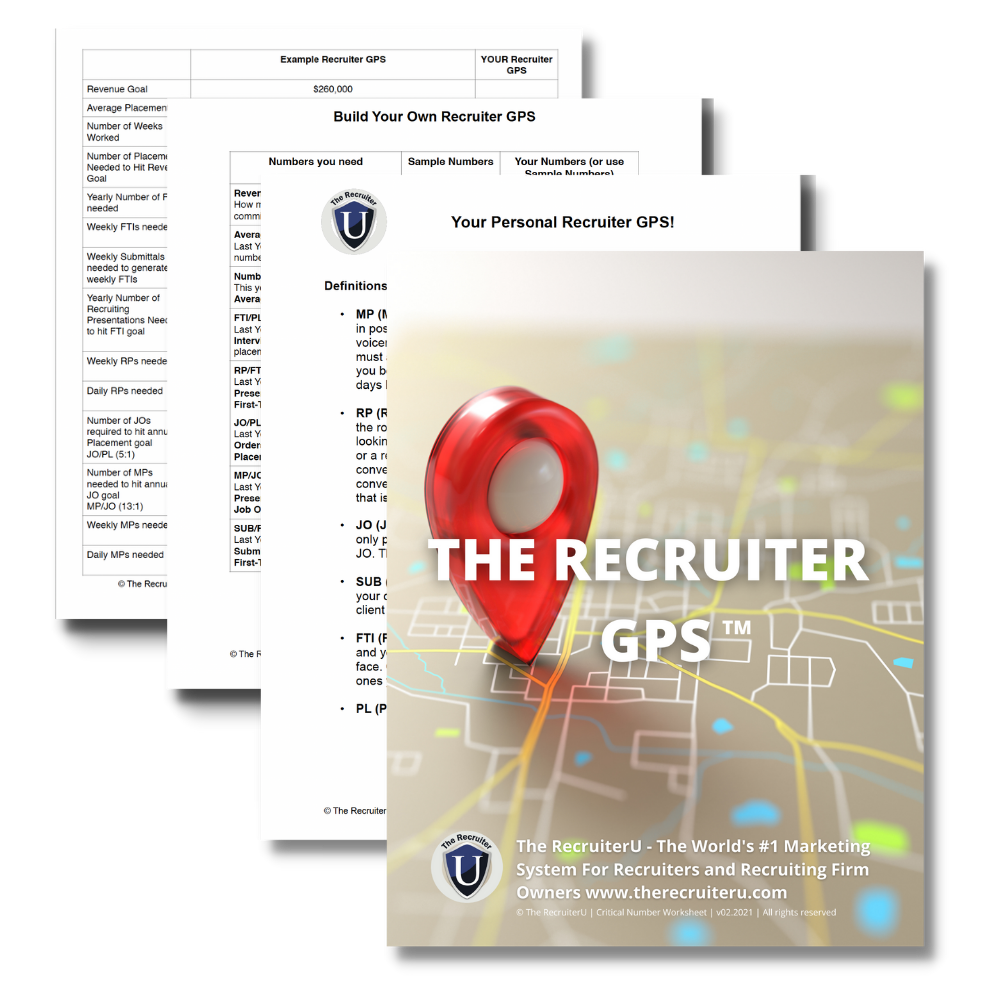Mike, it’s the beginning of the year, and we’re coming off our best year ever, but I’ve seen some of our recruiters’ activities drift. What are some things I can do to maintain a standard of productivity with my existing team members?
This is a common occurrence, especially after people come off of a great year, and last year, 2022, for most of the people we work with, was one of their best years, if not their best year ever.
Using Metrics to Help Your Recruiters Achieve Personal Goals
If you’re not using metrics, KPIs, this is one of those ways to show people a path to what they want for themselves versus an accountability tool that you’re going to “beat them up with” when they don’t hit their numbers.
Here’s a quick example of how I would use metrics to hold a recruiter accountable to a $300,000 billings goal. Let’s say at $300,000 in billings in your firm, they’re going to make $100,000.
The first question is, have you tested the $100K? I would want to see how they’ve allocated all the money they’re going to make and that they have specific silos for their income. Often, if I hired somebody who wanted to make $100K, they had never made more than $50 or $60K. If they want to make more money than they’ve made before, that is aspirational money. What would they do with that aspirational money?
Prefer to Watch? Click the video below to hear directly from Mike. Otherwise, scroll to keep reading!
Identify the Delta Between Livable and Aspirational Money
Let’s assume state, local taxes, federal taxes, and social security, eats up about 30 grand. You’re down to $70,000 net. Most people don’t do that. They think a hundred thousand. And let’s say their bills total $50,000 a year—rent or mortgage, car payments, taking care of their family. There’s a $20,000 delta meaning there’s $20,000 that is aspirational.
I found early in my career as a manager, both as a sales manager for a publicly traded company and as a recruiting firm manager, that there are two types of people. Some, without any help from you, know exactly what they want to do with that money, and they just want to know how to make it. Others often just think, wow, it would be nice. I could probably take nicer vacations and get a better car. That becomes the challenge; their outcomes are not defined.
I have no judgment as to what those things are, and I don’t care where anyone wants to take their aspirational money, but I don’t want aspirational money just to be aspirational. I want it to be defined.
Clearly Define How the Aspirational Money Will be Allocated
If this is your challenge with your recruiters, I invite you to sit down with them and have them do that breakdown. Have them review the checkbook and statements and identify where their money went in the last few months.
What is your monthly nut?
How much do you need to live?
Then, what is the monthly income you want to make?
And finally, where would this aspirational money be allocated?
Is it to remove credit card debt? Is it to get a better car? If so, what is the car? What is the down payment? What are the monthly payments? Is it a better vacation? Exactly, specific, and precisely where do you want to go? Don’t tell me the beach, don’t tell me the islands, don’t tell me a ski trip. I want to go to Vail and stay at the Four Seasons. And in season, that’s a thousand dollars a night, and I want to go for a week. Great. Now you’re looking at, with flights and all the other stuff, a 10 to $12,000 trip. No judgment.
This is the key for those of you running a firm or if you’re a solo operator to define your revenue goal. It will be more on billings, net of expenses, not commissions. But, it’s the same, exact process.
What are you willing to fight for? Or, is that ski trip nice to have? Because my experience is, 60, 70% of people aren’t motivated enough to push through the level of discomfort they need to for a nice to have versus, I really want this.
It doesn’t mean they need it. Most of us have significantly more than we need. We need shelter, some food, and some water. That’s what our needs are. It’s beyond that. It’s giving yourself permission to aspire to that. And then what I’ve done with a couple of clients, and I did this with a couple of my recruiters, if it was a trip where they could put a small down payment, I would say book the trip.
What if I don’t make it? The only reason you won’t make it is if you don’t execute to your targets. And that’s the whole thing. That is the beauty of metrics.
Break Down Annual Goals to Daily Activity Targets
You’ve heard me do this math at $300,000 for those of you who’ve been around for a while. Let’s say an average fee of $25,000. That’s 12 placements a year or a placement a month. Conservatively eight first-time interviews to a placement. Our clients are six and a half, but conservatively eight interviews to one placement per month is two interviews per week. Two interviews per week is probably, 30 to 40 candidate conversations, depending on your desk and your ability.
You may need to take four job orders to make one placement if you’re all contingency. That’s four job orders a month. It’s about 13 marketing conversations to a job order. Let’s say it’s 15, so I can do the math easily again. It’s three a day. Three times five is 15. So if I’m at seven recruit presentations a day and three marketing conversations a day, that’s ten conversations a day.
That means I’ll bill 300,000 bucks. I’ve never seen it not happen. 20 years as a search firm owner, 15 years as a coach, I’ve never seen someone honestly hit their KPIs and not hit their billing target. So this is a great question, and I’m spending a lot of time with it because there are many moving parts to it, the way you hold people accountable.
So let’s go back to that $300K billing, $100K earnings. They say they want the trip to Vale, a ski trip. It’s 12,000 bucks, and they want to eliminate $8,000 in credit card debt. Good goals. That eats up all of the $20K in aspirational money. I check, and I double-check. When are you going to go on the trip? That may be a year out now. I’d have them book the room, maybe not the flights, but book the room. And how do we know we’re on target? We’re on target when you’re getting eight interviews a month, not when you make $25,000 a month. Placements are an eight to 12-week lead trailing indicator of your performance.
If they are rigidly committed to the goal of $300,000 in billings based on everything I just said. Your job is to coach them to get to two interviews a week. It’s getting them to 10 conversations a day or 50 a week. And, you will know tomorrow, at the end of business, if they are on target. Did they talk to 10 people? It is literally that simple.

Map out a plan to HIT and EXCEED targets next year – without working longer or harder hours.
Hold Them Accountable
And a lot of times, when I set goals with people, I check their numbers on the first day. I didn’t micromanage and check their numbers every day. Sometimes I just checked it after the first day to see how serious they were. And let’s say they were averaging seven, and they come in the next day with seven combined conversations.
I’m like, Mr. / Ms. Recruiter, you’re not serious. You’re not going to do $300K.
Mike, how can you say that it’s only been a day?
Because yesterday mimicked your previous performance, which was a $200K year, I like a 200 K year. I’m not going to fire you for $200K a year. But your performance didn’t change the way you committed to changing it. So do we change your performance tomorrow, or do we abandon the goal and admit to yourself that you’re not willing to work for it?
There’s no in-between. You’re either going to work toward it, or you’re going to adjust the number.
So thank you so much for that question. A fantastic, fantastic question.
P.S. Whenever you’re ready… here are 4 ways I can help you grow your recruitment business:
1. Grab a free copy of my Retainer Blueprint
It’s the exact, step-by-step process of getting clients to give you money upfront. https://get.therecruiteru.com/retainer
2. Join the Recruiter Think Tank and connect with firm owners who are scaling too. It’s our Facebook community where smart recruiters learn to make more money and get more freedom. https://www.facebook.com/groups/there…
3. Join me at our next event
3x a year, I run a 3-day virtual intensive, sharing the 9 key areas that drive a 7-figure search firm. Click here to check out the dates of our upcoming event: https://get.therecruiteru.com/emerge
4. Work with me and my team privately
And if you ever want to get some 1:1 help, we can jump on the phone for a quick call, and brainstorm how to get you more leads, more placements, and more time. https://get.therecruiteru.com/scale-now

Recent Comments